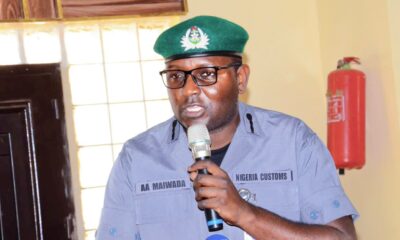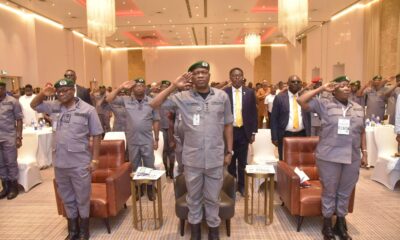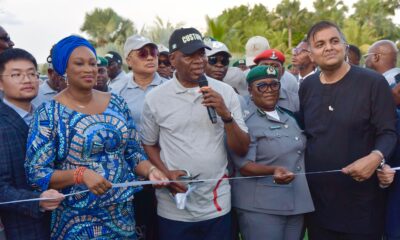Customs Report
‘B’Odogwu Is A Defining Evolution Driven By Purposeful Leadership’ – Onyeka

BY EGUONO ODJEGBA
The Area Controller of the Nigeria Customs Service (NCS), Tin-Can Island Port Command, Comptroller Frank Onyeka has said that B’Odogwu is not only a defining evolution in the ongoing nation’s home grown customs modernization drive but one executed and sustained by focused leadership.
Comptroller Onyeka in a chat with seasoned, senior maritime journalists in his office recently, applauded the Comptroller General of Customs (CGC), Bashir Adewale Adeniyi MFR, for the B’Odogwu initiative, noting that it is about the biggest technological independence in customs administration in the continent.
This is even as he declared that the Tin-Can Island Customs Command is on course with the partial implementation of B’Odogwu, noting that all things being equal, the implementation will come full swing any time soon as all the processes and resources designed to operationalize the platform is already in place and running.
It will be recalled that the CGC in March this year announced the deployment of the “B’Odogwu” platform in the Apapa and Tin-Can Island ports in Lagos, following its successful trial pilot phase at the PTML Command by the last quarter of 2024.
He explained that although B’Odogwu is a big deal given its relative, recent history, Onyeka averred that the platform remains central to trade and lawful trade facilitation to the extent that both importers and their clearing agents, together with officers of the command remain united in ensuring that its success is collective and it treated as a critical national asset.
“You will all agree with me that B’Odogwu is phenomenal in the sense that it is our own home grown technology. In Africa l think it is the biggest deal in customs administration with our amiable CGC Adeniyi providing focused leadership and as the driving force.
“He dreamed it, believed in it and rallied the service and stakeholders to key into it and you will agree with me that the pilot scheme at PTML was an extraordinary turning point. So coming back to Tin-Can, l can tell you for free that we are on course, remember that B’Odogwu is just a platform, the expected efficiency is dependent on other variables plus honest declaration.
“B’Odogwu is impartial and cold as the wheel of justice, it treats entries mechanically and as accurately as what is fed to it, so to facilitate trade and expect efficiency, importers and clearing agents must feed B’Odogwu with true and honest entries so that it does not fault documentations which will logically cause for fresh lodgment with its associated delays.
“It has been so far, so good, remember that during a pre-launch stakeholders’ engagement at the Apapa Command, the CGC stated that it was a pre-launch and not a final launch. This is because Tin-Can port is a much bigger operational port. Hopefully, few months from now, B’Odogwu will become fully operational here as well,” Onyeka said.
The Tin-Can Customs boss said his overall target is to achieve the much desired trade compliance by importers and their freight forwarders, noting that trade compliance alone is key to the success of both B’Odogwu and the other customs statutory mandate, including revenue generation and enforcement.
Accordingly, he says that he and his management team have activated the right processes to enthrone an era of compliance without impeding trade.
Until recently, Tin-Can Island Port being the nation’s second largest seaport reportedly ranked as the most notorious customs area command with the highest incidents in cargo clearance crimes ranging from ‘container flying’ (local parlance for questionable missing containers) to criminal concealments and trafficking in prohibited items to the under-declaration of cargo and underpayment of customs duty.
The port was also notorious as the second biggest entry point that supports criminal syndicate that specializes in cargo documents cloning also known in local parlance as ‘machine outside. The perpetrators not only weaken and cause great damage to the trade system but had also aided the stealing of hundreds of billions of naira on a yearly basis in revenue theft. It is believed that the criminal regime dates back to early 2000 and still subsists in some covert and subdued forms, strong enough to continue to shortchange the federal government of substantial revenue.

Upon assumption of duty as the Customs Area Controller, Comptroller Frank Onyeka who has served previously as the Deputy Comptroller of Enforcement, Apapa Area Command, apparently not unfamiliar with the unwholesome sharp practices, immediately bolstered the monitoring strategies he inherited in mitigating the corrupt devices to its barest minimum.
He has been unequivocal in the strict implementation of trade facilitation that also aligns with the promotion of the national security. These are exemplified in the quick turnaround time, increased stakeholders’ civic responsibility to national values and in the discouragement of criminal tendencies, reduction in operational downtime, improved professionalism by officers and men; and the collective ideal to promote national growth through best practices.
He has continued to preach compliance in all the stakeholders’ meetings he has had since assumption of duty, especially in the freight subsector to bring them up to speed on some of the emerging policies of the federal government being implemented by the Nigeria Customs Service.
Speaking on the B’Odogwu Clearance System, Onyeka not only urged the stakeholders to prepare themselves seriously for the full launch of the scheme in the command, but since the pre-launch, have continued to explain that every reform is designed to create a more trade friendly environment for all port users.
To walk the talk, he has also continued to warn that his administration expects stakeholders increased compliance to countermand the regime of multiple alerts on cargo; a concern he has dealt with reasonably and purposefully; and which has created huge relief for stakeholders.
On the last count under his watch, the Command has reinforced the enthronement of the one-stop-shop operation which eliminates multiple alerts, for a long time already regarded as a nightmare to importers and freight forwarders.
The scenario was such that as examination of containers are carried out and the items released at some point, cargo movement are often halted following the triggering of ‘multiple alert’. It was considered very frustrating as it meant fresh checks, query and amendments.
Onyeka’s commitment to achieve the successful implementation of B’Odogwu at the nation’s second largest seaport reflects the various measures undertaken to ensure that projection of the Service projection remains on a positive trajectory.
This is also exemplified in the steady increase in revenue generation, and the assurance that under his watch, the Command revenue target of N1.524 trillion for 2025 is realized, all things being equal.
Already, it is on record that the command has collected the sum of ₦347,935,672,476.00k for the first quarter, January and March 2025. The figure is 12.6% higher than the ₦304,000,000,000.00k generated in the corresponding period of 2024.
While the revenue collection for January 2025 stands at ₦116, 412,735,766.23, h representing 24.06% rise compared to ₦88, 430,126,122.76 recorded within the corresponding period of 2024, in February of 2025, the commanded collected ₦103,254,292,839.23k which was also 2.90 % over and above the sum of ₦100,253,187,074.72k collected within the corresponding period of 2024.
In March 2025 a total of ₦128,268,749,635.00k was collected, which is 10.3% higher than the ₦115,100,000,000.00k generated over the corresponding period of 2024.
A top flyer administrator with a firm, knowledgeable and competent grip on men and resources, and given his versatility in customs administration in addition to his impressive anti-smuggling credential, Onyeka’s recent posting perhaps signposts yet again, a very instructive, result driven posting by the Adeniyi led customs management.
Comptroller Onyeka’s simple message is for stakeholders to do more honest declarations so that seamless operational environment will exist, with all sides, positively benefiting, and thereby also improving the sustenance of financial good governance and national security. He promised to continue to engage stakeholders as at when necessary, noting “this is a crucial part of ensuring the success of these initiatives. Through constant collaboration and feedback, we aim to address concerns, foster a better understanding of the processes, and ultimately ensure smooth implementation of all customs tools and fiscal policies of the government.”


































